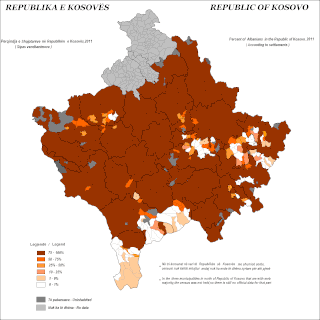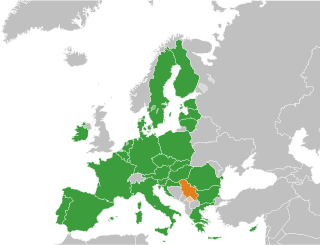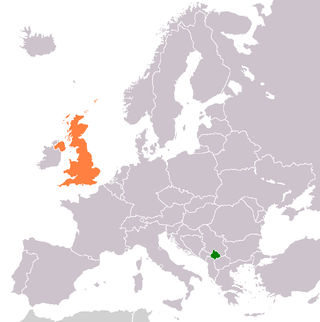
The Kosovo War was an armed conflict in Kosovo that lasted from 28 February 1998 until 11 June 1999. It was fought between the forces of the Federal Republic of Yugoslavia (FRY), which controlled Kosovo before the war, and the Kosovo Albanian separatist militia known as the Kosovo Liberation Army (KLA). The conflict ended when the North Atlantic Treaty Organization (NATO) intervened by beginning air strikes in March 1999 which resulted in Yugoslav forces withdrawing from Kosovo.

Kosovo, officially the Republic of Kosovo, is a country in Southeast Europe with partial diplomatic recognition. It is bordered by Albania to the southwest, Montenegro to the west, Serbia to the north and east, and North Macedonia to the southeast. It covers an area of 10,887 km2 (4,203 sq mi) and has a population of approximately 1.6 million. Kosovo has a varied terrain, with high plains along with rolling hills and mountains, some of which have an altitude over 2,500 m (8,200 ft). Its climate is mainly continental with some Mediterranean and alpine influences. Kosovo's capital and most populous city is Pristina; other major cities and urban areas include Prizren, Ferizaj, Gjilan and Peja.

The State Union of Serbia and Montenegro or simply Serbia and Montenegro, known until 2003 as the Federal Republic of Yugoslavia and commonly referred to as FR Yugoslavia (FRY) or simply Yugoslavia, was a country in Southeast Europe located in the Balkans that existed from 1992 to 2006, following the breakup of the Socialist Federal Republic of Yugoslavia. The state was founded on 27 April 1992 as a federation comprising the Republic of Serbia and the Republic of Montenegro. In February 2003, it was transformed from a federal republic to a political union until Montenegro seceded from the union in June 2006, leading to the full independence of both Serbia and Montenegro.

1999 (MCMXCIX) was a common year starting on Friday of the Gregorian calendar, the 1999th year of the Common Era (CE) and Anno Domini (AD) designations, the 999th year of the 2nd millennium, the 99th year of the 20th century, and the 10th and last year of the 1990s decade.

The Kosovo Liberation Army was an ethnic Albanian separatist militia that sought the separation of Kosovo, the vast majority of which is inhabited by Albanians, from the Federal Republic of Yugoslavia (FRY) and Serbia during the 1990s. Albanian nationalism was a central tenet of the KLA and many in its ranks supported the creation of a Greater Albania, which would encompass all Albanians in the Balkans, stressing Albanian culture, ethnicity and nation.

The North Atlantic Treaty Organization (NATO) carried out an aerial bombing campaign against the Federal Republic of Yugoslavia during the Kosovo War. The air strikes lasted from 24 March 1999 to 10 June 1999. The bombings continued until an agreement was reached that led to the withdrawal of the Yugoslav Army from Kosovo, and the establishment of the United Nations Interim Administration Mission in Kosovo, a UN peacekeeping mission in Kosovo. The official NATO operation code name was Operation Allied Force whereas the United States called it Operation Noble Anvil ; in Yugoslavia the operation was incorrectly called Merciful Angel, possibly as a result of a misunderstanding or mistranslation.

The Kosovo Force (KFOR) is a NATO-led international peacekeeping force and military of Kosovo. KFOR is the third security responder, after the Kosovo Police and the EU Rule of Law (EULEX) mission, respectively, with whom NATO peacekeeping forces work in close coordination. Its operations are gradually reducing until the Kosovo Security Force, established in 2009, becomes self-sufficient.

Hashim Thaçi is a Kosovar Albanian politician who was the president of Kosovo from April 2016 until his resignation on 5 November 2020 to face a war crimes tribunal on charges of crimes against humanity. He was the first prime minister of Kosovo and the Foreign minister and deputy prime minister in the new cabinet led by Isa Mustafa, which assumed office on 08 December 2014.

The Albanians of Kosovo, also commonly called Kosovo Albanians, Kosovan Albanians or Kosovars, constitute the largest ethnic group in Kosovo.

The Kosovo national football team represents Kosovo in men's international football. The team is controlled by the Football Federation of Kosovo, the governing body for football in Kosovo, and is under the jurisdiction of FIFA globally.

Serbia applied to join the European Union (EU) in 2009 and has been a candidate for membership since 2012, along with nine other states. Serbia is the largest country in Southeast Europe seeking entry into the EU.
Foreign relations of Kosovo are accomplished by efforts of the Ministry of Foreign Affairs of Kosovo. Kosovo operates 33 embassies abroad and is host to 22 embassies in Pristina. Kosovo has membership in several international organisations.

International governments are divided on the issue of recognition of the independence of Kosovo from Serbia, which was declared in 2008. The Government of Serbia does not diplomatically recognise Kosovo as a sovereign state, although the two countries have enjoyed normalised economic relations since 2020 and have agreed not to try to interfere with the other's accession to the European Union.

Lesbian, gay, bisexual, transgender, and queer (LGBTQ) rights in Kosovo have improved in recent years, most notably with the adoption of the new Constitution, banning discrimination based on sexual orientation. Kosovo remains one of the few Muslim-majority countries that hold regular pride parades.

The Autonomous Province of Kosovo and Metohija, commonly known as Kosovo and abbreviated to Kosmet or KiM, is an autonomous province that occupies the southernmost corner of Serbia, as defined by the country's constitution. The territory is the subject of an ongoing political and territorial dispute between the Republic of Serbia and the partially recognised Republic of Kosovo, with the APKM being viewed as the de jure interpretation of the territory under Serbian law; however, the Serbian government currently does not control the territories because they are de facto administered by the Republic of Kosovo. Its claimed administrative capital and largest city is Pristina.

Kosovo–United Kingdom relations are foreign relations between the Republic of Kosovo and the United Kingdom of Great Britain and Northern Ireland. When Kosovo declared its independence from Serbia on 17 February 2008, the United Kingdom became one of the first countries to announce the official recognition of a sovereign Kosovo on 18 February 2008. The United Kingdom has had an embassy in Pristina since 5 March 2008. Kosovo has had an embassy in London since 1 October 2008. The two countries have very good and friendly relations.

The Kosovo Security Force (KSF) is the military of Kosovo. The KSF is tasked with defending the sovereignty and territorial integrity of Kosovo, military support for civilian authorities, and participation in international peacekeeping missions and operations. Since 2018, it is in the process of transforming into the Kosovo Armed Forces.

The Kosovo Agency of Statistics monitors various demographic features of the population of Kosovo, such as population density, ethnicity, education level, health of the populace, economic status, religious affiliations and other aspects of the population. Censuses, normally conducted at ten-year intervals, record the demographic characteristics of the population. The latest census started on 5th of April 2024 and according to the preliminary results, the Republic of Kosovo has 1,586,659 inhabitants, of which 795,046 are men (50.1%) and 791,614 are women (49.9%). The same year, US CIA World Factbook estimate put the country's population at 1,977,093. According to the first census conducted after the 2008 declaration of independence in 2011, the permanent population of Kosovo was 1,739,825.
The 2019–20 Football Superleague of Kosovo season, also known as the IPKO Superleague of Kosovo for sponsorship reasons with IPKO was the 21st season of top-tier football in Kosovo. The season began on 17 August 2019 and will end on 26 July 2020. A total of 12 teams are competing in the league: ten teams from the 2018–19 season and two teams from the 2018–19 First Football League of Kosovo. Feronikeli are the defending champions from the previous season.

Vjosa Osmani-Sadriu is a Kosovan jurist and politician who is the current president of Kosovo since 2021. Osmani was born and raised in Titova Mitrovica, SFR Yugoslavia and studied law at the University of Pristina and the University of Pittsburgh School of Law. She worked as an advisor to the president of Kosovo Fatmir Sejdiu before she was elected to the Assembly. Osmani held the position of Speaker of the Assembly of Kosovo from February 2020 to March 2021, and also served as acting president between November 2020 and March 2021 after the resignation of President Hashim Thaçi. Upon her election as president, Osmani became the second woman to hold the position, as well as the first person to have served as both acting president and president of Kosovo. Osmani successfully ran on an anti-corruption platform and has expressed a desire to normalize relations between Kosovo and Serbia. Since taking office, Osmani has returned the flag of Dardania as the official symbol of the presidency.


















